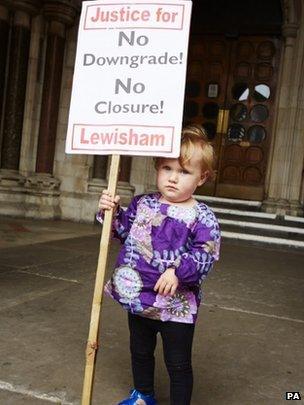Is the NHS digging itself into a hole?
- Published

The threat to Lewisham Hospital stirred local passions
Hearing the news about hospital reconfigurations this week, the well-used proverb 'when you find yourself in a hole, stop digging' comes to mind.
No matter how hard the NHS tries it just can't seem to get decisions about the closure of services right.
News that a judge had ruled the decision to downgrade Lewisham Hospital in south London as unlawful should come as no surprise.
After all, the health service has become mired in legal fights over the years - as the long-running attempt to overhaul child heart surgery has shown.
But just as the judge was announcing his verdict on the Lewisham case, elsewhere in the country another administrator was setting out plans for another overhaul of services.
Again, they involved a fundamental downgrading of services.
The crisis-hit Mid Staffordshire Trust - the one at the centre of the recent public inquiry - is to be dissolved and the most complex services its two hospitals provide, such as trauma care and emergency operations, are to be handed over to other trusts in the region.
It will leave the trust focusing on providing routine care to its elderly population.
Both cases have involved the use of the same process - administration.
This is a new concept for the health service and is based on the model used in business to take tough decisions.
These are the only two areas to have gone through it so far.
That, of course, begs the question: why is the NHS intent on diving head first into another administration process when its first attempt has proved so problematic?
The short answer is that the NHS desperately needs to reorganise its hospital services.
In an era when the most complex care the NHS provides is getting increasingly specialised, services are having to be provided from large regional centres rather than district general hospitals.
Traditionally, the NHS has tried to achieve this change itself.
Local areas have taken charge of drawing up plans and carrying out consultations.
But the problem has been that reaching consensus has often taken years.
For example, Greater Manchester has recently reorganised its maternity and A&E networks, but that took the best part of a decade.
With money now tight, ministers have recognised there is a need for quicker decision-making. Hence, the interest in the administration concept.
However, one of the key criticisms of the Lewisham case was that it was too quick and did not take into account local views enough.
Essentially, the NHS veered from one extreme to another.
What is more, the Lewisham decision had always seemed a strange one.
It was ordered by an independent administrator - and agreed to by ministers - after a neighbouring trust ran up huge debts.
By comparison, the Mid Staffordshire proposals seem much more sensible. The time taken to draw up the plans and consult is longer and the changes less drastic.
It is early days, but there is already much more confidence within the health service.
Unison, which has been a vocal critic of the way NHS reorganisations have been handled, praised the Mid Staffordshire administrator for taking his time and resisting the temptation to make 'snap decisions'.
NHS Confederation chief executive Mike Farrar shares the optimism, but also has words of warning.
He says the health service must prepare itself for more of these processes in the future.
"We can no longer afford to drag out decisions of this kind for years," he explains.
The hope now is that the way out of the hole is to keep digging.